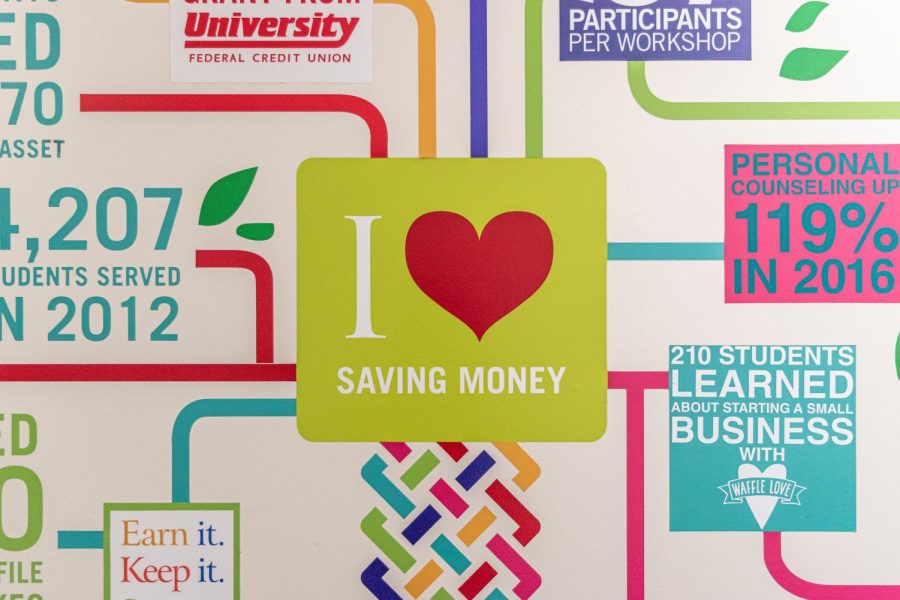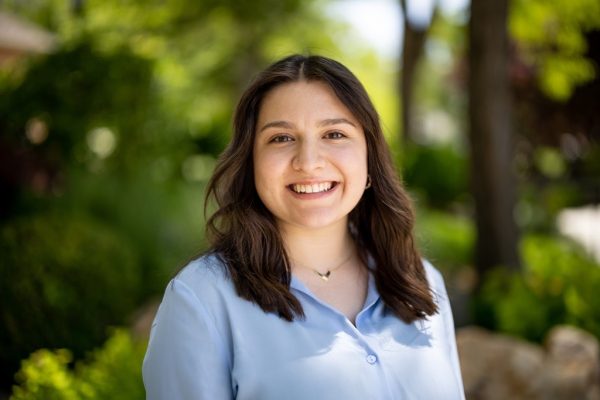Investing in a Future: U Financial Counselors Provide Toolbox for Money Management
A wall of statistics is on display outside of the financial wellness center, which can be found on the third floor of the A. Ray Olpin Union building on the University of Utah campus in Salt Lake City, Utah on July 1, 2022. (Photo by Jack Gambassi | The Daily Utah Chronicle)
August 29, 2022
The Financial Wellness Center at the University of Utah offers one-on-one financial counseling to all students for free.
Ann House, the director of the Financial Wellness Center and financial counselor, said the center offers unbiased sources and insight on budgeting, saving and financial preparedness to help students make the best financial decisions.
House explained how supporting the overall wellness of individuals is a concept that encompasses the goals of the center.
“We have to take the whole person into account [because] worries about money affect mental health, physical health [and] academic life,” House said.
Budget
Beth Hunsaker, the assistant director of the Financial Wellness Center and financial counselor, said it’s easy to fall into poor spending habits, but one of the most important components of financial wellness is creating a budget for each month which can act as a base for spending, investing and repaying debt.
“Going to school is not just tuition,” House said, noting the many other expenses students have, including textbooks for classes, mandatory fees and food. House suggested that students know exactly how much money they need to survive per month and budget accordingly.
Hunsaker said a budget can be more of a “living document” than a perfect, strict plan because unexpected things happen in all of our lives that affect our financial wellness that cannot be anticipated.
Savings
Hunsaker said the next step students can take on the path to financial stability is to open two savings accounts — one for standard savings and another as an emergency fund.
“I suggest you get it fully funded and then you stick it in an online savings account and not think about it,” Hunsaker said.
With an emergency savings account, Hunsaker said there is always something to fall back on.
House suggested that standard savings accounts should be used for expenses that do not typically fall under a specific budget category. When shopping for clothes, House said she tries to shop during end-of-season sales to get the best deals, but sometimes there are clothes she needs that cannot wait for the sale.

“Maybe I need a coat and I need to go to that preseason sale and that’s where the savings come in,” House said, explaining her winter coat is not a usual monthly expense, so her budget allows using her savings to purchase it.
Hunsaker recommended trying to develop a habit of saving early in life, even if it starts out with saving only 10 dollars a week, because it shows someone they are capable of saving consistently.
Preparing for a Recession
The probability that the U.S. economy will go into a recession has increased due to “high inflation, rising interest rates, shaky economic activity and volatile markets,” according to the New York Times. Hunsaker said this makes it more important than ever to practice healthy financial habits.
“Review your spending habits,” Hunsaker said, adding high gas prices might mean changing a budget and reallocating money to different categories.
Hunsaker emphasized the importance of creating an emergency fund during times like these because students are taking time out of the labor market to attend school, which is an investment financially, mentally and academically.
“Really focus on that investment and put more into yourself,” Hunsaker said.
House reiterated that finances should be a top concern throughout the recession. She said prioritizing debt repayment is also important with the possibility of a recession.
“If students do have some debt, there are things that they can do,” House said.
She added that their offices can help students sort out things such as credit card debt and collections. Hunsaker said the U offers several programs to help students of any financial status including the Feed U Pantry, an on-campus resource that offers non-perishable, nourishing food for students, their families, faculty and staff. They post updates on what food they’re currently providing on their Facebook page.
Another resource offered at the U is the Basic Needs Collective, which provides a “central location for resources related to food security, affordable housing, health insurance, managing finances, legal services, and mental health,” according to their website.
“If everyone … calculated some upcoming expenses and had something in their savings, even adding two dollars a month to it, it becomes that habit,” House said. “We don’t know how bad it’ll be, but this is what we can do to protect ourselves.”
Students can talk with a financial counselor by setting up an in-person or virtual appointment through the Financial Wellness Center’s website or via their chat function.









